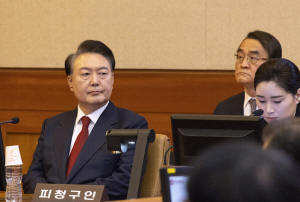How South Korea's Constitutional Court is deciding on the president's
future
 Send a link to a friend
Send a link to a friend
 [February 13, 2025]
By KIM TONG-HYUNG [February 13, 2025]
By KIM TONG-HYUNG
SEOUL, South Korea (AP) — South Korean President Yoon Suk Yeol is
putting up a desperate fight for his political life at Seoul’s
Constitutional Court after being impeached and arrested for his
short-lived imposition of martial law last year. After weeks of
hearings, the court is nearing a decision on whether to formally remove
him from office.
Yoon’s legal saga, which also includes a separate criminal indictment on
rebellion charges, has become a stress test for the country’s democracy,
which has been challenged by deepening political polarization and
distrust.
Yoon’s conservative supporters rioted at a Seoul court that authorized
his arrest; his lawyers and ruling party have openly questioned the
credibility of courts and law enforcement institutions; and Yoon has
continued to express contempt for his liberal rivals, endorsing baseless
conspiracy theories about election fraud to justify his ill-fated
authoritarian push.
If Yoon is dismissed, that would trigger a presidential by-election that
could test voters’ trust in the electoral process, while a decision to
reinstate him could fuel further instability if the public see it as
unjust.
The Constitutional Court’s ruling, expected by March, will be a crucial
moment for South Korea. Here's a look at how it's being decided.

How the process works
Under South Korea's constitution, the National Assembly has the power to
impeach presidents but not to remove them from office. After an
impeachment, the president's powers are temporarily suspended and a
trial begins at the Constitutional Court. The court has 180 days to
either remove Yoon from office or reject the impeachment and restore his
powers. If he’s thrown out of office, a national election to choose his
successor must be held within 60 days.
The Assembly made specific charges against Yoon when impeaching him —
misusing military force, circumventing legal processes to declare a
state of emergency, and attempting to disband the legislature — but the
court is only required to rule on whether or not he can remain in
office. Removing Yoon would need the votes of six of the court’s eight
justices.
Was the declaration of martial law legal?
Yoon faces criminal accusations of attempted rebellion over his
short-lived declaration of martial law, but the Constitutional Court is
focusing on a relatively simple question: whether he had legitimate
grounds to declare martial law on Dec. 3.
The constitution limits the exercise of that power to times of war or
comparable national emergencies.
Yoon has argued that his martial law decree was necessary to overcome
the “anti-state” liberal opposition, which he claims improperly used its
legislative majority to block his agenda.
After winning a landslide victory in last year's legislative elections,
the liberal opposition impeached several of Yoon's key officials and
blocked his budget bill. Yoon's side says those moves created a crisis
that required drastic action.
But Yoon’s National Security Director Shin Won-shik told the
Constitutional Court on Tuesday that Yoon began floating the idea of
using his emergency powers before the general elections in April.
Did Yoon follow legal protocols?
The National Assembly has also said that Yoon sidestepped a
constitutional requirement to deliberate in a formal meeting of the
Cabinet before declaring martial law.
Yoon called 11 Cabinet members to his office shortly before declaring
martial law on late-night television, but most participants, including
Prime Minister Han Duck-soo, have said the gathering did not qualify as
a meeting and that Yoon unilaterally informed them of his decision
rather than inviting deliberation.
[to top of second column]
|

South Korea's impeached President Yoon Suk Yeol, left, attends a
hearing of his impeachment trial at the Constitutional Court in
Seoul, South Korea, Thursday, Feb. 13, 2025. (Joen Heon-Kyun/Pool
Photo via AP)

The meeting also failed to follow legal procedures required for
formal state council meetings: no agenda was proposed, no signatures
were collected from participants and no minutes were recorded. Yoon
told the court Tuesday that he thought the records could be produced
later through electronic approval.
Several top officials, including Han, Deputy Prime Minister Choi
Sang-mok, and Foreign Minister Cho Tae-yul, said they attempted to
talk Yoon out of the decision, citing potential damage to the
country’s international reputation and economy.
But Yoon went ahead with the martial law declaration, saying that
his “perception of the situation” was different, according to public
prosecutors’ criminal indictments of Yoon and his former Defense
Minister, Kim Yong Hyun, who played a key role in the events.
Former Interior and Safety Minister Lee Sang-min, one of Yoon’s
closest allies, is the only participant who has said the Dec. 3
Cabinet meeting had substance, telling the court on Tuesday that
officials engaged in “passionate debates.” Yoon has said that it
makes “absolutely no sense to suggest that Cabinet members came to
the presidential office just for an informal meeting or to hang
out.”
Did Yoon try to disband the legislature?
Finally, the Assembly accused Yoon of attempting to dissolve the
legislature, something that is beyond his constitutional powers even
under martial law.
A military decree that followed Yoon’s declaration stated that “all
political activities are prohibited, including activities of the
National Assembly and local councils,” and hundreds of troops were
deployed to the National Assembly, including special operation units
who broke windows while unsuccessfully attempting to reach the main
chamber.
Legislators managed to assemble a quorum in the chamber despite the
assault and voted unanimously to lift the state of martial law.
Yoon and his lawyers have maintained that the martial law
declaration was intended as a temporary and “peaceful” warning to
the liberal opposition, and that he had always planned to respect
lawmakers' will if they voted to lift the measure.

He said the troops were there to maintain order, not to disrupt the
legislature.
But the Assembly has pointed to testimonies by some military
commanders, who have described a deliberate attempt to seize the
legislature that was thwarted by hundreds of civilians and
legislative staff who helped lawmakers enter the assembly, and by
the troops’ reluctance or refusal to follow Yoon’s orders.
Yoon’s claims have been contradicted by testimony from Kwak
Jong-keun, the now-arrested commander of the Army Special Warfare
Command. Kwak said the president directly instructed him to have
troops pull the lawmakers out, desperate to prevent the 300-member
Assembly from gathering the 150 votes necessary to overturn his
martial law order. Yoon has denied accusations that he sought to
arrest key politicians and election officials.
In addition to surrounding the legislature, hundreds of other troops
were sent to National Election Commission offices the same day. Yoon
says he was aiming to investigate election fraud allegations, which
remain unsubstantiated.
All contents © copyright 2025 Associated Press. All rights reserved |